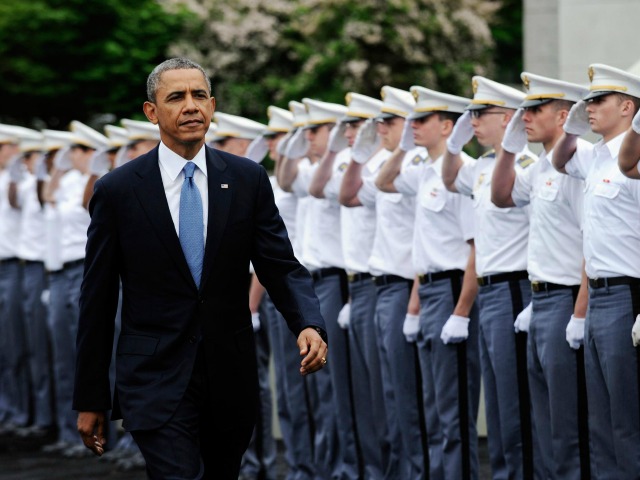
President Obama has faced low job-approval ratings for much of his presidency. In the current RealClearPolitics average of polls, his job-approval is currently 42%. According to Gallup, Obama’s job-approval has never averaged more than 48% in each of his last four years in office.
A new survey from Gallup, however, shows Obama crossing a threshold from which presidents don’t rebound. Obama’s personal approval ratings are now underwater.
Gallup notes:
Americans’ views of President Barack Obama as a person have turned slightly negative, with 47% saying they have a favorable opinion of him and 52% an unfavorable one. That net favorable rating of -5 is the least positive personal assessment of Obama to date.
Personal approval ratings are far more important than the ups-and-downs of job approval numbers. Outside events, often beyond the control of the White House, can weigh down job approval numbers. They can also cause a bump in these numbers. A president’s personal approval ratings, though, act as a kind of check on how much job-approval numbers can swing.
Obama’s current personal approval ratings are the lowest of his presidency. A majority of Americans do not find Obama “honest and trustworthy.” A majority no longer think he is a “strong leader” or “shares their values.” Just 34% of Americans believe he has a “clear plan” for solving the nation’s problems.
These results aren’t the result of hyper-partisanship. Earlier this week, Pew Research Center released a survey concluding that Americans are far more partisan and idealogical than in years past. This is possibly true, although given how much politics impacts our daily lives, it is hardly surprising. It also doesn’t explain, in itself, Obama’s low approval ratings.
For much of his presidency, Obama’s job approval numbers have tracked closely with previous presidents. Throughout his first term, his numbers were in-line with Presidents Clinton and Reagan. At the midterm elections of their first terms, Obama’s job approval numbers were slightly higher than Clinton’s and Reagan’s. (George W. Bush’s approval ratings were very high in the aftermath to the 9-11 terrorists attacks.)
After their successful reelections, however, Clinton and Reagan enjoyed higher approval ratings throughout their second terms. In their final years in office, the two men had approval ratings in the high-50s and low-60s. Both left office around the peak of their job approval numbers.
Since his reelection, however, Obama’s numbers have tracked more closely with George W. Bush’s approval numbers. Bush’s approval numbers held where Obama’s currently are until the Iraq uprising in early 2006. After that, and a concurrent drop in his personal approval ratings, Bush’s job approval numbers collapsed, never to recover. The Democrats swept to control of Congress just months later.
Obama is on the cusp of repeating this history. Any hope that he could repeat the successful second terms of Clinton and Reagan have evaporated. Obama won reelection not on the issues, but on the question of which candidate was more “in touch” with average voters, according to exit polls. Today, however, Obama seems increasingly out of touch.
Earlier this week, answering questions on social media site Tumblr, Obama said the world was “less violent” than ever before. Politicians can be excused a certain amount of rhetorical flourish, but Obama’s statement flies in the face of what Americans read every day in the news.
Ukraine is in the midst of a minor civil war. The Middle East is wrecked by conflict and Syria and a burgeoning sectarian civil war in Iraq. Islamic militants are escalating violence in Pakistan, Nigeria, and North Africa. Even to a casual observer or Americans dependent on the mainstream media for information, the world certainly doesn’t seem to be overflowing with peace.
The White House seems flat-footed in dealing with these crises.
Whatever one’s opinion of the circumstances surrounding the Bowe Bergdahl prisoner exchange, it ought to be clear to all but the most-partisan observer that the decision to announce the swap in a Rose Garden ceremony was a political mistake. The high-profile announcement, with Bergdahl’s parents as supporting characters, was likely intended to dominate the Sunday political shows the following day.
The White House, however, had full knowledge of the potential controversy surrounding the release of the five Taliban leaders and the murky details of Bergdahl’s capture. That it plowed ahead organizing one of the more iconic bits of theater a president possesses suggests not just tone-deafness, but an almost pathological desire to bend the political narrative in its favor. A successful White House understands its own limitations.
Presidencies have a rhythm and have a diminishing ability to dictate the narrative as the time in office lengthens. In just a matter of weeks, the political dialogue will be overwhelmed by the looming midterm elections. Even if the Republicans do not sweep control of Congress, they will make significant gains.
Just a few months after that, the nominating campaigns for the 2016 Presidential election will be in full swing. Obama will have little opportunity to shape political events as these events dominate the headlines.
Barring some extraordinary event, Obama is probably locked into low job approval and low personal approval ratings. America is closing the curtain on the Obama presidency.

COMMENTS
Please let us know if you're having issues with commenting.